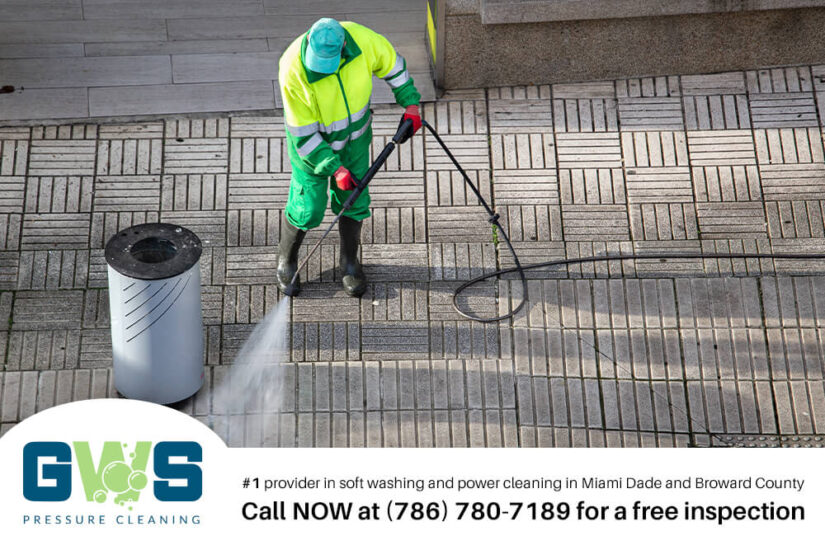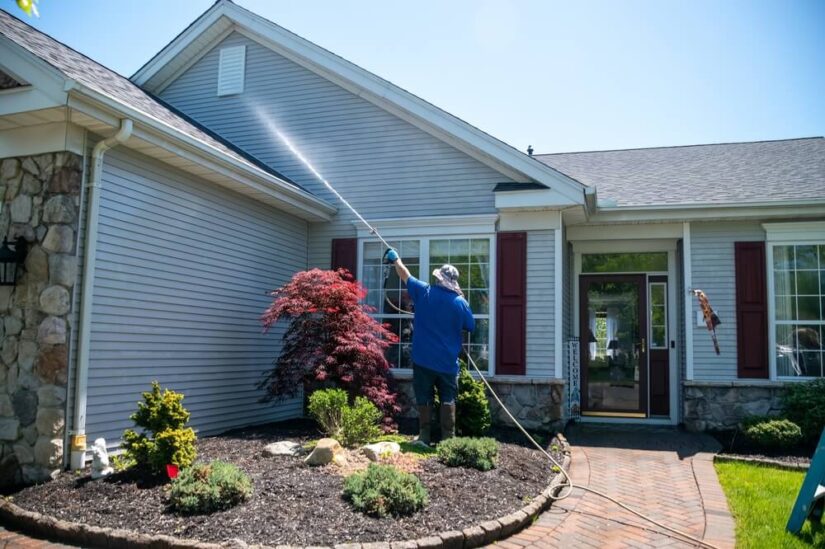The Ultimate Guide to Home Pressure Washing

For countless homeowners, the notion of home maintenance is a vast spectrum, ranging from the mundane tasks of sweeping and dusting to the intricate care of plumbing and electrics. However, nestled within this spectrum is a transformative gem: home pressure washing. It’s more than just a superficial cleanse; it’s a rigorous rejuvenation of a home’s exterior, blasting away the accrued layers of grime, algae, and mildew that time bestows upon it. Such washing doesn’t merely augment aesthetics — it fortifies the home against potential decay, ensuring its visage remains as pristine as the day it was first seen, and thus reinforcing its steadfast stance against external elements.
GWS Pressure Cleaning Services
Get an Instant QuoteEssential Equipment: Choosing the Right Pressure Washer
Navigating the market of pressure washers can feel daunting. With a plethora of options touting various features, how does one determine the best pressure washer for house siding? Let’s dissect the variables:
- Power Source: Electric washers might be apt for smaller, frequent tasks, while their gas-powered counterparts harness more power for expansive areas.
- Pressure Capacity: Measured in PSI (pressure per square inch), a higher PSI can cleanse more effectively but also holds the potential to damage delicate surfaces.
- Nozzle Variety: Different tasks might require different spray angles.
- Portability: A bulky machine might be cumbersome for multi-story homes.
For those seeking the best home pressure washing equipment, it’s crucial to match the machine’s capabilities with the home’s demands. Is the primary goal to freshen up the vinyl siding or to rigorously deep-clean a moss-laden brick pathway?
Making the Right Choice: Gas vs. Electric Pressure Washers
Like two knights in armor, gas, and electric pressure washers each champion their own realm of advantages. Gas pressure washers command respect with their sheer power. Unrestricted by cords, they offer unparalleled mobility and typically greater PSI. However, their strength comes at the cost of noise, weight, and a more demanding maintenance routine.
Conversely, electric pressure washers, while perhaps less potent, shine in the arenas of user-friendliness and environmental consciousness. Their operation is a whisper compared to the gas variant’s roar. For those with smaller homes or more minor tasks, electricity might be the home pressure washing champion they seek. Yet, this choice should be tailored to individual needs, factoring in frequency of use, area size, and desired results.
The Ideal Timeline: How Often Should You Pressure Wash?

Every homeowner takes pride in their home’s appearance. A house isn’t just a structure; it’s an embodiment of the memories created within its walls, the familial gatherings in the yard, and the countless mornings spent admiring its beauty. Over time, however, even the most cherished homes face the inevitable wear and tear of the elements. Dirt, mold, mildew, algae, and a host of other contaminants can diminish the shine and appeal of your home’s exterior. Enter the solution: pressure washing. This includes not only the main structure but also essential areas like the garage, where garage pressure washing can eliminate stubborn stains and grime, restoring the overall pristine look of your property.
Pressure washing has emerged as one of the most effective methods to restore a home’s exterior to its former glory. But the question that often nags homeowners is, “How often should you pressure wash your house?”
As a general guideline, it’s advisable to pressure wash your home at least once a year. This yearly maintenance ensures that you’re getting rid of accumulated grime, dirt, and mildew before they become more deeply embedded or lead to more significant problems like paint chipping or wood decay.
However, this isn’t a one-size-fits-all answer. Several factors can alter this timeline:
- Climate and Environment: Homes in humid areas, such as Miami, may require more frequent pressure washing due to faster mold and algae growth. Similarly, if you live near unpaved roads or construction sites, dust and dirt might accumulate more quickly on your home’s exterior.
- Tree Cover: Homes under dense tree cover can be more susceptible to moss growth and bird droppings, necessitating more regular cleanings.
- Recent Events: After a major storm or hurricane, debris, dirt, and contaminants can cake onto a home’s surface, making a pressure washing session crucial.
Different parts of your home may have different home pressure washing needs:
- Driveways and Walkways: How often should I pressure wash a driveway? Given the regular traffic, oil leaks, and exposure, driveways, and walkways can benefit from being pressure washed twice a year.
- Decks and Patios: Depending on usage and exposure to elements, consider pressure washing these areas annually to remove mold, mildew, and dirt.
- Fencing: Wooden fences, especially, can gather mold and mildew quickly. An annual wash can extend the fence’s lifespan and maintain its appearance.
Besides maintaining aesthetic appeal, regular pressure washing can:
- Extend the life of your paint job.
- Prevent wood rot and structural issues.
- Increase property value.
- Offer health benefits by removing allergens.
In conclusion, while the annual pressure washing guideline is a solid starting point, each home has its unique needs based on its surroundings, usage, and external factors. The key is to monitor your home’s exterior regularly and understand the signs when a pressure wash is due. By staying proactive with your maintenance routine, you can ensure your home remains a sparkling gem in your neighborhood. When in doubt, the experts at GWS Pressure Cleaning are always here to advise and assist with all your needs for pressure cleaning in Florida!
The Perfect Mix: Crafting an Effective Home Pressure Washing Solution
Armed with the ideal pressure washer, one’s attention must turn to the concoction it dispenses. The realm of pressure washing solutions is vast and varied, encompassing everything from DIY mixtures of dish soap and water to potent, commercial-grade detergents designed to vanquish stubborn stains.
Eco-conscious homeowners might gravitate towards green solutions, which cleanse effectively without harming Mother Nature. However, it’s paramount to ensure the chosen solution is harmonious with the home’s material to prevent inadvertent damage.
Frequently Asked Questions About Home Pressure Washing
What is home pressure washing?
Pressure washing, also known as power washing, involves using a high-pressure stream of water to remove dirt, grime, mold, mildew, and other contaminants from various surfaces, including home exteriors, driveways, patios, and more.
How often should I do home pressure washing?
It’s advisable to pressure wash your home at least once a year to remove accumulated dirt and prevent potential damage. If you’re wondering what is the best time to pressure wash a house in Florida, factors like your local climate, the presence of trees, and recent weather events can influence this timeline.
Is home pressure washing safe for all types of siding?
While pressure washing is safe for most siding materials, such as vinyl, brick, and wood, it’s essential to use the correct pressure setting and technique. We always recommend consulting with professionals or researching your specific siding material before proceeding.
Can I do pressure washing by myself?
While there are DIY pressure washing units available, there are risks involved, including potential damage to your property or injury. Professional services like GWS Pressure Cleaning have the expertise and equipment to ensure the job is done safely and effectively.
What’s the difference between home pressure washing and soft washing?
Soft washing uses a lower pressure combined with special cleaning solutions to clean surfaces. It’s often recommended for delicate areas like roofs, where high-pressure roof pressure cleaning could cause damage.
Does pressure washing use a lot of water?
While it may seem that way, professional-grade pressure washers are designed to be efficient. They often use less water than a garden hose delivering the same amount of cleaning power.
Will pressure washing remove paint?
If not done correctly, pressure washing can chip or strip paint. However, professionals know the right techniques to clean without causing damage. If you’re specifically looking to strip paint, pressure washing can be used as a method.
Is pressure washing eco-friendly?
When done responsibly, pressure washing can be environmentally friendly, especially when using eco-friendly cleaning solutions. GWS Pressure Cleaning prioritizes the use of green products to protect our environment.
Can pressure washing damage windows or seals?
Using too high a pressure or directing water at the wrong angle can potentially damage windows or seals. That’s why it’s vital to use a professional service that understands these nuances.
How long does it take to pressure wash a house?
The duration depends on the size of the house and the specific areas being cleaned, but on average, it can take anywhere from 2 to 5 hours.
What preparations should I make before pressure washing?
Ensure all windows and doors are closed, remove delicate items from the area being cleaned, and cover electrical fixtures. If using a service, they will typically provide a list of preparations ahead of time.
For any other questions or to schedule a pressure washing service, don’t hesitate to reach out to GWS Pressure Cleaning. We’re here to make your home shine!


